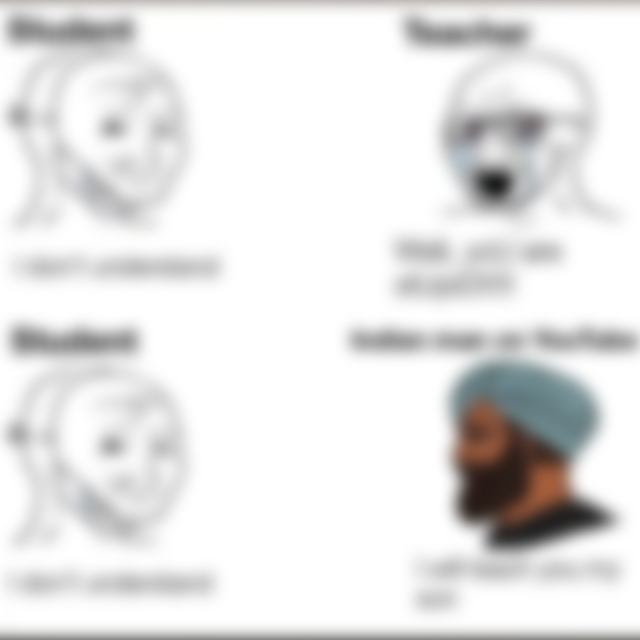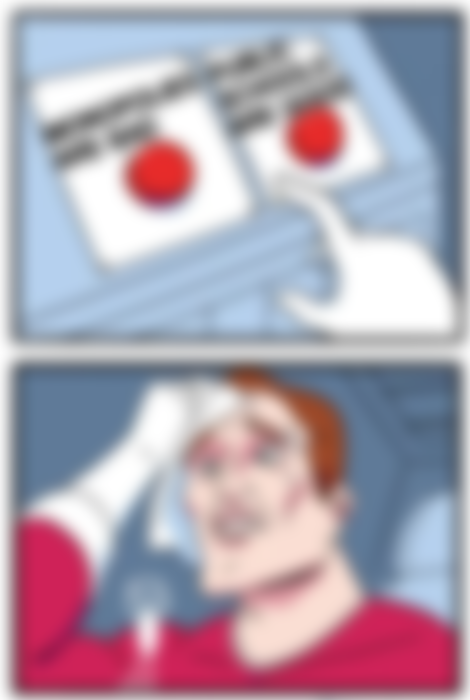How school damaged your mental health [part 2]
Schooling-abuse awareness, and what we can do about it

In part 1, I argued that state schooling damages your mental health by depriving you of your sense of self-ownership. It does so by forcing you to follow specific curricula, and twisting your innate self-discipline into submissive involuntary obedience. In essence, schooling is a well-into-your-20s denial of the freedom to own your life’s path, and to structure an identity based on your own voluntary decisions. School represents the forceful dictating of how you spend your developmental years based on blanket one-size-fits-all arbitrary decisions by clueless technocrats with no accountability or even expertise in the matter.
Its outcome? Schooling renders you subservient, unmotivated, manipulable, and passively reliant upon parent figures to tell you what to do next. No wonder self-accountability is rare.
There is no parent figure more potent than the religious entity of “the state.” Conveniently enough, the state that benefits from your school-induced subservience gets to enforce its own brand of schooling.
Schooling is not equal to education; quite the opposite.
School denies you the opportunity of self-determination, and keeps you in an ignorant bubble unaware of how the world really works. It renders children naïve to the psychodynamics of interpersonal relationships because children are denied the early opportunity of having to compete in the professional world. Schooling keeps children stuck in dictated passivity where they can’t utilize their initiative, especially at an age when they need to practice it the most, if they are to achieve an identity and sense of self-worth.
On your behalf, the state chooses useless generic subjects, and denies you your participation in your own education’s selection process. It teaches you how not to think, what not to say, and how not to criticize mainstream orthodoxy’s one-sided dogmatism.
Why school is abusive
Here I break down the individual ways in which mandatory state schooling is hazardous to the mental health of children, who then carry their trauma into adulthood. Yes, you’ve been traumatized by schooling.
Some points overlap, but I think they deserve individual consideration.
1. Disselfment

By definition, schooling denies your identity, and your opportunity to explore the values, principles and ideals that make you you. Denial of identity starts with school uniform; children are not even allowed to explore their own self-image and appearance - a vital aspect of early experimentation. Then, school denies children ownership over their choice of curriculum, activities, personal beliefs, critical thinking. Children can’t even choose to opt out of school to pursue their own interests, or to work and feel useful and empowered.
Through the debilitation of schooling, children are conditioned to feel like the have no ownership of their critical choices, because they can’t have any ownership. Such hard choices define an individual early on in life, because they grant him responsibility and feedback on what works or not for him.
By depriving children of this freedom to explore who they are, we have ended up with a society of fragile infantile individuals with no identity, accountability or conviction. Without early proof of efficacy, adults find it difficult to earn deserved and meaningful confidence in themselves. Even mistakes can give you confidence, as long as they were yours to make and own them. And if you can make mistakes early in life, you are less likely to be defined by them because you have so much time in front of you to self-correct. Plus, early experience means you are less likely to make mistakes when you’re older, when it’s much less forgiving.
Without self-ownership, we grow up without a sense of self. School levels down children into one group of indistinguishable units, who then experience difficulty finding an individual identity. Naturally, as adults, they will likely find themselves desperately clinging on to the first delusional ideology that promises them a cut-and-dried collective identity - any identity will do.
Without a sense of self, we have no self-accountability, since we never had the chance to own our actions through free trial and error. We then get accustomed from an early age to attribute our failures to others, since others get to make choices for us. So, we presume that our debilitation belongs to someone else. Even our gloating in our successes feels like an impostor syndrome, since we feel our choices were somehow made for us.
Lastly, children lose their individual identity in school because school treats them as a collective, not as an individual. The needs of the arbitrary concept of “the whole” takes precedence over the individual. Without an identity, it is no surprise that people tend to fall for collectivist tribalism and demagogy.
The relentless psychological abuse of forced schooling plunges you into a dissociative state. No wonder we’re surrounded by sociopaths.
2. Dogmatism
Schooling conditions children to adhere to one-sidedness and unquestionable dogmatic faith in mainstream narrative. Yes, there is one truth, but there are many interpretations of truth. There is one fact but many narratives. Schooling does not teach this. It teaches one interpretation, one narrative - critical thinking is discouraged, because there is only one correct answer in the exam. Yes, mathematics is absolute, but history and economy theory aren’t. And these last two are crucial to criticize. Schooling does not teach logic or argumentation from first causes, so it fosters religiosity instead of reason.
Whenever children express their natural skepticism in school, they are dealt with dismissive disrespect, and a reference to textbook truism. The message is: “Your opinion doesn’t matter. You have no place questioning anything. You are not valued.” Children internalize this, and they carry this crippling insecurity into adulthood.
Schooling kills children’s innocent curiously and natural skepticism. It supresses their rebellious spirit, pounds them down and tames them to religiously believe in the sanctity of a “preapproved” interpretation of reality. Yet science is founded on skepticism, doubt and suspicion - schooling is anti-science in that it portrays its version of “the science” as unquestionable dogma with no room for constructive criticism. How can you trust what you think you know without challenging your cherished beliefs?
This dogmatic conditioning thus renders us gullible against deceivers and manipulators.
There is a thin line between education and indoctrination.
3. Subservience
Schooling teaches children to obey rules, not because there is incentive to gain from following preferred guidelines, but because there is an implied threat from failing to comply. Children are aware that schooling is mandatory, and that force will be used against them and their parents if they decide not to submit to state despotism.
Schooling treats obedience as a virtue, when it is not. It is a vice and a vulnerability.
“Discipline” is yet another evil deceptive excuse for child abuse. Instead of proving to children how it is in their best interest to follow certain principles, we dictate to them how to behave “just because we say so.” This is how patriarchal/matriarchal social structure are established: we use threats instead of incentives for social order. So, children grow up to do things out of fear, without knowing why they do it; just like the 5 monkeys ladder experiment. It also teaches them that they can arbitrarily enforce their will on anyone under their power.
The only discipline is self-discipline. Discipline to others it submission.
School is abusive because it relies on authority and the threat of punishment. It is threat-based, not incentive-based. With threat-based systems, you need to comply in order to not be punished. On the other hand, incentive-based systems do not punish if you don’t do what you are asked to do, but they reward you if you choose to do it. (Yes, when someone initiates aggression against you, you can still use extreme violence to defend yourself. Incentive-based systems are about incentivising people to get out of their default state to do what you want them to do.)
School conditioned you to submit to perceived authority, to be subservient, and to worship the cult of statism.
Punishment and inflexible “rules” program children to sit when they are told and shut up when instructed by perceived “authority.” Their voice doesn’t matter. Children quickly forget how to ask “why”, as they unquestionably obey orders to conduct hellish Sisyphean tasks like homework for useless nonsense that they never chose, and were never interested in.
The carrot side of the schooling’s carrot-and-stick tactic is rewarding obedience and conformity with grades, stars and good-boy glitter, which gives some children the “right” to gloat to their peers. Grading serves to quantify children’s worth in their eyes; but their worth is not quantifiable. Quantifying their worth implies comparison, which severely damages the self-esteem of children who aren’t interested or submissive enough to be top students. It also fosters a sense of deluded narcissism in grade-A students who come to falsely perceive obedience as a virtue.
Tell children enough times to shut up and stay still, and you condition them to believe that their voice and their needs don’t matter. No wonder we are society of weak, unassertive, passive submissive, pathetic people - especially males.

The propagandist subversive nature of public schooling admitted by one of its staunchest proponents, Archibald Murphy.
4. Elitism
The school grading system erodes self-confidence, and in inflicts unnecessary stress on young sensitive souls. Grading also promotes a sense of elitist hierarchy that relies on just one arbitrary metric.
The school grade is nothing more than a measure of how much of your self-ownership you are willing to submit to your perceived authority in exchange for privileges at the expense of others. I was a top student; I should know.
Grade ranking comes with rewards and punishments. So, it coerces children to disregard their ungraded strengths in favour of only one trait that is inorganically promoted by centralized power: a meaningless test grade measuring how submissive they can be to arbitrary nonsense.
School grading is an beta-version social credit score.
This way, school grading promotes elitism. It forces children to interact with each other in non-voluntary groups and settings, and then enforces an arbitrary ranking based on arbitrary grades.
in school, children are forced to associate with people they never chose, so they form cliques, just like prison gangs. Since this clique formation is a product of fear and insecurity, children in these groups feel empowered to mirror their abuse from schooling onto other children who weren’t fortunate enough to find themselves in the safety of a group. Clique culture is another form of elitism taught in school - the tyranny of the many. Systematic bullying is a product of schooling, because only in a coercive school environment is a child forced to spend most of his time with his abusers without adult supervision, and with no option to just escape.
Elitism breeds narcissism and superiority complexes. It also promotes entitlement to undeserved benefits, since grades reward what doesn’t offer any value to anyone. Imagine feeling that you deserve rewards for work that no one asked for, and no one benefits from. Grading is just a doggie treat for conformity. In real life, what is truly rewarded is the value you offer to other people; only the free voluntary market gets to define that value through voluntary exchange. Instead, schooling conditions elitist high-achiever students to expect rewards without offering value, just by the merit of being “good students”. So now we have generations of people who expect to be rewarded for nothing, as they demand free state handouts and housing at the expense of others.
5. Passivity
Schooling conditions you to be passive, and to trust more the opinion of unmotivated government employees than your own. With all those years of mandatory schooling, you don’t get to choose a path for your life - it’s been decided for you. No one gives you the benefit of the doubt to choose, and no one trusts you to be able to do so. As a student, you are constantly reminded that “children aren’t capable of making such decisions for themselves” even though you had a pretty good idea early on in life about what you wanted to pursue, what you valued, and with what you identified. Nobody respected your inclinations, and the deity of “the state” always “knew better” for you.
Since nobody trusted you with your own life, you withdrew into passivity and low self-confidence. You never had to make hard choices early on in life, and yes, even fail through trial and error - at least the errors would have been yours to own. So now you don’t feel like you own yourself, and therefore, you don’t feel self-accountable - you’ve been treated as someone too irresponsible to make responsible decisions. No wonder our society is one of blame and finger-pointing, and lacking self-accountability.
If no one ever trusted you to make decisions for yourself, how can you feel confidence in yourself? How can you have conviction in your judgment? How can you trust yourself to initiate action or be proactive?
Schooling renders you passive in an inert state, with no proactivity, no initiative, no sense of control over your life, no sense of ownership of your precious time and effort. This passivity makes you manipulable and subject to brainwashing, which explains why it is so easy for state propaganda to turn normal people into obedient loyal supporters of authoritarian genocidal regimes.
Passivity kills proactivity and initiative. A society full of males without individual initiative is one doomed to die in mediocrity, subservience, slave-like obedience to arbitrary “authority”, and child-like reliance upon state mothering.
6. Productivity loss
Depending on country, some atherosclerotic clueless bureaucrat once decided that all children need X amount of years receiving Y amount of hours in specific arbitrarily chosen subjects. Why? By which standard were these subjects and their depth chosen?
At least 12 years of mandatory indoctrination - that’s what school really is - deprives children of actual work experience; the greatest education available to them. Not only is early work experience crucial to developing self-confidence and self-ownership, but it is also economic potential forever lost.
Countless work-hours are lost in years of pointless schooling in subjects that are forever useless for most students. This “well-rounded education” argument is yet another baseless claim that fails to account for opportunity cost. “Whatever you learn is good” but at what cost?
What schooling does is render you passive and useless for the entirety of your childhood and young adulthood. You then feel resentful and useless when you enter the workforce (begin feeling useful to society) quite late in your life. Do we really need to ask then why most adults are hopelessly insecure?
7. Infantilism, adulthood delayed, and life postponed
Children are not responsible for their mistakes. It’s irresponsible for an adult to demand more responsibility from children than from himself. Yet schooling keeps us childishly irresponsible by prolonging childhood and therefore producing infantilized adults.
We are biologically designed to start having families in our late teens and early twenties; our reproductive function attests to that. Not only that, but nothing beats your first crush. You will not bond with your spouse as strongly if she were your second than you would if she were your first. If she were your 20th?! Forget about it. Nature helps us get attached only if we do it early. We are ready and primed to pair-bond for life with our first relationship, early. Waiting until our 30s because we need to finish our post-doc before we start thinking about family is a recipe for loneliness or, even worse, settling for leftovers. The best people tend to be taken early.

This prolonged infantilism hurts boys the most. Boys cannot take ownership of their life until their late twenties - when they can actually start getting an identity for themselves through their utility to society. Before that, the don’t feel empowered or confident enough to get the girl they wanted in their teens - when it’s biologically favourable to do so. So, late in the game in their 30s, they settle for a lost career woman boss-girl drunk on self-importance and delusions of grandeur. Nature gives us those hormonal urges in our teens because it’s trying to tell us that that’s when we should pair-bond with our first and only partner. Delaying this is just a guarantee for a promiscuous deathscape of a meaningless life that is a shadow of what could have been.
With schooling, boys remain boys because they never had their rite of passage, their initiation into manhood. They can only get this through proving themselves useful to society, skilful in attaining resources, and able to provide security for their families; this is what men do, what women look in a man. So, girls are obviously attracted to the older boys who sort-of managed to acquire a sense of self-ownership for themselves through professional advancement. So, many girls don’t want the boys their age - why would they? Boys their age are children; they can’t own their lives or produce value - they’re just stuck in school. Girls might show interest in some boys their age, but only to satisfy their tormenting sexual urges - girls won’t settle down with a boy their age because he’s not a man yet - he hasn’t proven himself valuable to society. How can he when he’s stuck in school?
So, boys turn to video games, drugs and porn to quench their unsatisfied urges and frustration from feeling undesired. We blame porn as the cause of porn addiction, but it’s not. Porn is just a symptom of a much larger problem: schooling. Schooling denies boys their self-identity and an early proof of manhood because it controls their livelihood, and smothers them like an over-protective hovering mother. Most boys feel totally undesirable until they begin to feel useful to the world, and that social utility is measured in professional success. There is no greater confidence in men like their ability to make money (gather resources). Schooling denies teens the right to work, or it discourages work by wasting their precious time with useless school curricula. So, teens and young adults feel like passive burdens to their parents, and useless undesirable pawns to society. No wonder existential issues, depression and drug addiction are prevalent. How else do we expect an undesirable to behave?
In essence, schooling delays social recognition and self-esteem. It renders us passive, without social acceptance, which could even be a pay check for a minimum-wage part-time job. Schooling denies us the sense of self-ownership that comes from choosing our destiny, even if it is deciding whether to work behind the register at McDonald’s or KFC; it doesn’t matter. Give any teen a job that makes him/her feel useful, and he/she will feel thrilled by the opportunity to provide value, to feel useful, and be recognised through appreciation and money. Schooling deprives us this, so schooling is damaging - purposefully.
Schooling deprives you of that early narrow window of opportunity to find your mate.
8. Entitlement
Another toxic side effect of school-induced infantilism is entitlement. Stay in school long enough, and you feel like the world owes you sustenance just for you to sit around and study, without producing any value to anyone. Sure, you might be preparing to offer value, but in real life, no one pays you until you actually do. Expecting to be paid for nothing is what is known as a socialist mindset.
Socialism is the psychotic entitlement to “society” owing “free” stuff to you, which is typical infant mentality. Yes, parents owe their children sustenance because the parents chose to bring the children into this world, without asking the child. But only their parents owe them, not other people. And parents only owe them until the children are ready to work from themselves. But if the state is willing to pay you to study forever, then why would you ever want to stop? This is why we get tons of eternal students and clueless PhD holders in useless topics no one asked for. These people tend to identify as socialists because they’ve grown accustomed to feel entitled to free handouts without offering any value to anyone in return. The state benefits from such willing slaves, people who kiss the hand that slaps them, as long as that hand throws at them some scraps every now and then.
9. Sexuality
Within the context of delayed adulthood, we must consider the effect of schooling on sexual health. Out bodies are ready for reproduction in late adolescence and early 20s. Yet adolescents are way too immature mentally to choose their lifetime spouse, because schooling kept them childish.
So we lose nature’s gift of being able to truly pair-bond early. This ability to bond fades quickly as we age. Ideally, we meet our mate in adolescence, court, then start a family by age 22 max - biologically, this is ideal. Yet how are adolescents supposed to be mature if they never had to make choices for their own life? How is anyone ready to start a family when they’re stuck in schooling, stuck with their parents, stuck in immaturity? In most schools in the world, students can’t even decide not to learn French. How mature can someone be if they don’t even feel confident in their own ability to make responsible choices?
So, how does that pent-up sexuality manifest? As anything that gets suppressed, it gets twisted: porn, perversions, addictions. Porn and leud lifestyles are not a problem in themselves - they are a symptom of a larger cause. If you are deprived of the natural opportunities to feel empowered so as to pair-bond with your teenage crush, then you’ll have to suppress and pervert nature’s gift of pair-bonding: sex.
Boys especially suffer for this. When their bodies are primed for ideal pair bonding, they are denied the opportunity to be responsible for themselves, their lives, and their choices. They are boys at heart in bodies that are just discovering manhood. Even if they do “get lucky”, sex for them is just a meaningless bodily function, since they lack the early maturity to be responsible with their sexual choices.
All this delayed adulthood is perhaps the main reason behind self-crippling meaningless promiscuity and perversion.
10. Parenting
Schooling substitutes parents by taking the role of institutionalised collective daycare. Clueless, uninspired lazy government employees get to see your children more than you see them. Read this again and again until you realise that it should be the only argument you’ll ever need against all state schooling. And in the little time you do get to have with your own children, they are too stressed over homework and exams, which keep reinforcing their sense of uselessness,. The irony that being useless at being a useless student is actually a good thing. Homework and tutoring on the same subjects ineffectively taught in school just prove how low the quality of uninspired disincentivized state schooling is.
How are you expected to be a good parent and connect with your children if you almost never get to engage with them? Yes, you have to work, but when you’re home, they’re busy with homework, tutoring, and maybe part-time work, if they’re lucky. Plus they need their own time with their peers. No wonder generational chasms exist.
11. Emasculation
State-enforced schooling is an attack on boys and masculinity in general. Schooling is geared towards girls - endless sitting and orderly passive learning. Boys are way more energetic; they need to move, interact, build, break, even conflict with others in constructive trial and error, and character building. in school, boys tend to underperform compared to girls. Restless as boys are, they receive the majority of berating and punishment by female instructors no less. Boys ae conditioned to be shamed and humiliated by females, and are taught to feel inferior to girls their age, which might be why many males grow to feel resentful of women (perhaps as an overcompensation of their bruised manhood).
Think about it: nature gives boys more restlessness and energy, which makes it much harder for them to sit and shut up and listen when their hormones run wild. It is torture. Since “schooling treats boys like defective girls,” the inevitable conclusion is that there is something wrong with the boys. Boys internalise this inference, which gets imprinted in them as they carry it through adulthood. No wonder a large majority of contemporary men are terrified to walk up to a woman their age, and flirt with her. No wonder they put women on a pedestal, and feel subservient if they passively find themselves in a relationship that the woman usually leads. This total reversal of gender roles - yes, there are nature-defining gender roles - is twisting society. No wonder we’re uninspired without hope for the future - evident in modern art and architecture, perhaps?
No wonder women ask “where are all the men?” They went extinct because we taught them that masculinity was shameful. And no wonder shamed frustrated males twist their masculinity into toxic masculinity of abuse, aggression and fanaticism, idolizing faux hyper-masculine caricature ideals like Nazi Germany or the Roman Empire.
12. Corruption
School teaches us early on that the world is corrupt, and that it rewards corrupt people. For example, government educators say “don’t steal”, yet they receive their pay check from taxes forcibly stolen from people who have no say in the matter. Sure, the government offers obligatory “services” with said taxes, but so does the protection mafia. What makes something worthwhile is freedom to choose. If you cannot refuse a “service”, then it is not a service - it’s blackmail.
Educators tell their students “not to hit”, yet the educators (and parents, for that matter) often hit children, or at least abuse children verbally and psychologically (public humiliation, for example). This mixed messaging confuses children. It teaches them that the world is hypocritical, and that people with institutional power get to do whatever they like, without moral inhibitions. If their educators get to do it, why not them?

Students understand that the state grants universities their monopoly on education accreditation. Just like a highwayman demanding a toll to let you pass, the state demands that you pay your dues and respect to its branches, so that only the state gets to define what ‘education’ means. It doesn’t matter if you’re self-taught or proven through experience, mentorship, professional recognition or portfolio. Unless you get a generic meaningless time-wasting state-sanctioned university degree, you are often not legally allowed to use your knowledge and skills. Students are consciously or subconsciously aware of this corrupt monopoly enforcement. It is corrupt, arbitrary and backed by the threat of state violence. So, children conclude that violence is the way to get things done, since society accepts and rewards this.
The reality is that state bureaucrats are in no way qualified to determine what sufficient qualification means; only the free market can do this through uninterrupted feedback from the labour market. Yet state monopoly on schooling teaches students that the strong - with circumstantial institutional power - get to impose whatever they want, without considering moral principles or even efficiency. For those who will point to private schools to object to me, I remind you that private school curricula are enforced by the state, and no private school diploma is “recognised” without state intervention.
13. Pathological narcissism
There’s another dark side of schooling: It creates a know-it-all attitude due to arbitrarily recognised “degrees” that come with impressive titles, presumed status and self-professed proficiency. But this narcissism is often misaligned with what the free market truly demands. Many get a degree but can’t seem to find a relevant job. This either causes extremely low self-esteem and disappointment, or, in the case of narcissists, it creates cognitive dissonance in them. The symptoms of cognitive dissonance are frustration, aggression and general psychopathy.
So, this centralization of education causes an entitlement in degree holders who can’t accept the fact that they can’t get a job even though they presume that they “should” get a job. They assume that the world owes them a cosy position, since they imagine they already “did the work.” The reality is that they were just enjoying the easy passivity and low demand of university life at the expense of society, for years, without offering organically demanded value to anyone.
I was a university student too. I was mostly a burden to society, and I couldn’t wait to finish. Universities are heavily subsidized by the state, so you’re living off society even if you pay the university. When I finished higher education, I realised that I never needed to go to university in the first place. There were professional qualifications and courses that would have cost me way less money and time, plus they were much more effective. And even if I needed state recognition to work in a specific area, I could have still done an online degree without wasting my life’s potential in student accommodation and soul-corrupting student life activities.
I too felt the resentment and arrogance when I couldn’t accept that a master’s holder couldn’t get a “deserved” job. I had certain expectations from my “superior education”; I was led to believe I was justified to feel entitled. But the free market didn’t recognise my education because it didn’t demand it. I couldn’t get an appropriate job because my “education” wasn’t providing value to anyone. I felt deceived, like having fallen for a scam. And this is what university is: false advertising and a scam. I soon came to realise that I had no one to blame but myself. It was humility that freed me from the painful arrogant entitlement of presuming that the world owed me for my stupid decisions to pursue useless degrees. University was a bad investment, one that I erroneously made in hopes of gaining the meaningless respect of an abusive father who purposefully withheld his approval to manipulate me. But that’s a different story.
State schooling creates deluded entitlements in people; entitlements to recognition, welfare or privileges. The free market, free from government violence, humbles us in a way that makes us appreciate each other’s voluntary contributions to each other. Only in a free market can people truly begin to understand that the only way to gain value is to offer value first.
In essence, this arbitrary state “recognition” of degrees causes a tormenting entitlement and resentment in arrogant degree holders who can’t seem to get the recognition they presume to deserve. This is detrimental to their mental health, since they deep-down know their arbitrary credentials mean nothing… So they mitigate their impostor syndrome by masking it with unhinged narcissism.
14. Shaming

Building on disselfment, schooling conditions children to be shame-based, and therefore manipulable and insecure. Notice how predominantly female educators use public humiliation as a disciplinary method to ensure compliance to school enforcement. Shaming comes from vexed oversensitive educators who verbally and psychologically abuse children as a form of punishment, a sort of twisted Pavlovian conditioning to instil obedience and order through fear; just like the military. And many of these educators seem to get a kick out of their power to abuse.
Children internalize this relentless public shaming because they lack support systems or self-confidence. Schooling applies a militaristic style of self-esteem breaking through humiliation and (de)grading. There is a shaming element that comes with grades due to its implied comparison of children with their “betters” in an arbitrarily quantifiable manner. This grade comparison is damages the self-esteem of children who are set against impossible-for-them standards. If these children have no nurturing support systems, no encouragement, and no direction from engaging adults, they have no alternative but to internalise the shame, and identify with it.
15. Physical health damage
There’s a somatopsychic effect of bad physical health that deteriorates mental health. State schooling is guilty of purposefully undermining children’s physical health, as well as suppressing their potential during their vital developmental window. Pushing ADHD medication and hormone blockers is the most obvious vicious attack on children’s physical health by schooling. Another is poor eyesight as the result of long hours in enclosed spaces. Stuck inside for most of the day, focusing on short-distance objects, like books and screens, during your developmental years isn’t exactly healthy.
The same applies to sitting for hours on end, when during those sensitive malleable years, the body is clearly designed to be active. Who arbitrarily decided that children should spend so much time sitting? - especially at an age when their bones grow faster than their muscles, which results in relatively shortened hamstrings, and all the muscular imbalances that carry on from that. Which old useless atherosclerotic bureaucrat, with his infinite “wisdom”, decided that “education” should include this amount of physical abuse to the body? Even private corporations are slowly acknowledging the health damage of prolonged sitting in adults, let alone in children who have to be physically active the most. The private sector is organically implementing healthy workplace practices. Is the state ever going to catch up?
Why education is better without state involvement
Free organic market pressures get to determine the ideal in society, in a particular moment in time. The same applies to education: no one knows what’s best to study other than the uninterrupted labour market with its demands and feedback. No state bureaucrat has any way of knowing what is best to study. Designing “education for all” on a whim is central economic planning akin to socialism.
Any child can learn to speak and write without having to submit to school coercion, just like it was during thousands of years of human civilization, when people built cathedrals and pantheons without a university degree. Yes, not everyone could read and write back then because they didn’t have to - there was more demand for effective farming than artful writing. State schooling is more interested in installing opinions rather than delivering knowledge that is freely available.
Everything school teaches is available for free online, in a library, in a book store, in a tutor’s portfolio. Children eagerly learn what they are interested in, when they are interested. If children are allowed to choose for themselves what to learn, they value it, and are self-motivated to educate themselves or seek mentorships on their own. If they get to decide what they feel holds the most promise for them, they are more likely to excel in it more than a subject arbitrarily chosen for them.

“But children are only interested in games and art, not maths and literature.”
This is a nonsensical objection. If we allowed children to contribute a little bit to the labour market, then they’d know how useful and rewarding education can be, and then maybe they’d be able to freely choose what they thought would build a meaningful future for them. Children are interested in play alone only when we waste all their energy on useless schooling. No wonder many get to hate education. If it’s coerced, you end up resenting it, even if it’s good for you. Yet atherosclerotic state bureaucrats with zero industry experience presume to know better about what each individual student should and should not learn.
“Oh, but without school, how would children socialize?”
A motte-and-bailey fallacy. Choose: Is the purpose of school to educate or socialize? Because this switching from argument to argument in defense of evil schooling just goes to show that there is no defending it logically. Children get to socialize in their chosen modular education, in their part-time jobs and in their community. Forcing children to associate with peers they never chose - such is the case in school and prison alike - is abusive, not sociable.
“Oh, but what about accreditation?”
…another ad-hoc fallacy in defense of state schooling. No, we don’t need school exams to attest to anyone’s competency. In almost every single industry, your portfolio proves what you can do; not an exam in which you can cheat to pass.
For those areas where you need accreditation, such as health, food and safety, we have private industry standards, which I trust way more than government. Why? Because private standards compete with each other, unlike the government, which is an enforced monopoly with no incentive or motivation to deliver anything of value. Private industry standards are always superior than minimal state standards. Private standards also emerge first, before any state standard rushes in to enforce itself and take all the credit just as the market was already adopting private standards organically. Anyone with industry experience knows this. Let’s not forget how the free market solved the ozone hole problem while state bureaucrats where talking and talking, enjoying their fat pay checks and lavish business trips, without any incentive to ever solve anything.
What we can do about it
Abolish all schools. Parents already teach children how to speak, read and write. After that, parents can expose children to various education options appropriate for their age. Media can include books, videos, courses, workshop opportunities, educational games, activities, etc. The important thing is to not impose, or even recommend any of these subjects. Just “leave them on the couch” - like a home-schooling friend of mine did - and then wait and see. Let their natural curiosity kick in. They will value a piece of intellectual stimulation more if they feel it’s their own idea to pursue it. And if they ask for help, it is the moral duty of the parent to help as much as he/she can.
Let me be clear: the child owes nothing to the parent; the parent owes everything to the child. The child didn’t get an opportunity to choose his/her parents, or to even be born. So, the parents are morally obligated to do everything in their power to be the best parents they can be for their children. The parents chose to bring children into this world. The parents never asked the children if they want to be born. So, the parents are fully responsible for their children’s happiness, growth, nurture, and guidance.

So what can be done, realistically?
Demand home-schooling in your region, or move to a country that allows it. The fact that most countries criminalize home-schooling goes to show how evil public schooling is, and how coercive supposed “modern democracies” are. It also shows how the state cannot survive without its indoctrination masked as “education.” It’s worth moving to a home-schooling country that will abuse your children less, even though the state still dictates curricula even in a home-schooling setting. If migrating is too difficult for you, at least find a way to abuse the system (like all government employees do). Maybe you can get your children diagnosed with a vague condition that enables you to keep them away from public schooling. At the very least, send them to a private school; it’s worth the investment.
We can also organise our fellow citizens to create pressure groups demanding home-schooling. We could also provide incentives for private education institutes to join in our pressure groups, if that could mean them getting more business through home-schooling courses and kits on specific topics.
What’s the difference of state schooling and private courses? Choice. Students have the choice to leave or choose somewhere else. Public schooling forces you to undergo one useless curriculum without asking you, then waste a specific number of your best years on it, and you don’t even get to choose the location of your school, and with whom you share the same prison. At least the private school has an competition-driven incentive to be less abusive to you, even though it’s forced to force state curricula on you.
Another idea is one parent getting a part-time job that will enable him/her to home-school. Your best life investment is your children - not making more money that you tell yourself are for your children, when it’s actually your selfish deluded immortality project. Children appreciate engaging parents more than parents who just spend money on them to ignore them. Home-school your children well so that they make a good example for others. It’s the only way society can heal.
The state needs public “education” to indoctrinate children into obedient civilians, and even with home-schooling, you can’t escape state-mandated curricula. But you can always use this as an example to prove to your children how evil, oppressive and abusive the state is. And that’s a good start for generations to come.

To demolish a wall, start with one brick at a time. Be free.

Recommended reading:

Read it for free: Murray N. Rothbard - ‘For a New Liberty: A Libertarian Manifesto’

Read it for free: Lloyd DeMause - The origins of war in child abuse
Someone you know wants to read this… Or needs to be trolled by it.
Subscribe for free. I won’t flood your inbox.











